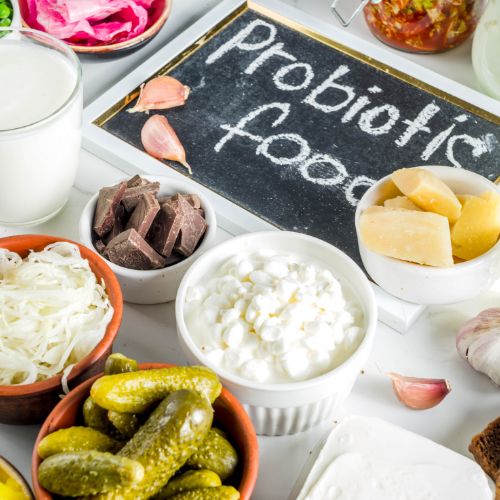The Anti-aging Secret In Your Gut

Written by Dr. Jewel Alfoure, ND
Keeping our appearance youthful is the main objective of an entire industry focused solely on the skin. Healthy, clean topical skin conditioning agents can play a role in maintaining the health of the skin and preserving its vitality. However, the world of healthy, youthful skin stems from deep inside our guts (1,2). Before diving into the realm of anti-aging gut health, it may be helpful to review the most important lessons related to topical skincare.
Lessons in Antiaging Topical Applications
-
Always start by removing skincare products before adding as the use of too many chemicals on the skin may stimulate immunity and cause skin breakdown/ oxidation promoting aging (3)
-
Increasing cell turnover by removing dead tissues preserves the skin looking younger (4)
-
Increasing collagen-building by applying collagen-stimulating topicals improves the fullness of the skin (5)
-
Applying topicals that stabilize melanocytes leads to more even skin pigmentation (6)
-
Applying emollients that help the skin heal from the inside prevents sun damage and other damaging environmental factors from harming the skin (7)
Topical Plant Oils and Skin Health
|
Plant Oil |
Topical Skin Effect |
|
Black Seed Oil (8) |
|
|
Cranberry Oil (9) |
|
|
Coconut Oil (9) |
|
|
Sea Buckthorn Oil (10) |
|
|
|
|
Rosehip Oil (12) |
|
|
Argan Oil (14) |
|
The Link Between Gut Health and Aging

Scientific evidence is slowly progressing in the study of the effects of our gut microbiome. Studies demonstrate a strong relationship between the diversity of our gut flora and the health/ wellbeing of the individual (15). For example, it was found that older adults who were more lean and active have similar probiotic patterns (16). Additionally, some researchers even claim that they can predict the age of the individual and the predisposition to different health conditions based on gut microbiome patterns (17).
The Probiotics of Youth

Bifidobacterium longum, B. breve, and B. bifidum are generally dominant in healthy breastfed infants. On the other hand, B. catenulatum, B. adolescentis are more prevalent in adults (18). Supplementation with bifidobacterium has been associated with a significant improvement in health (19). That association was hypothesized to be due to the production of the bacteria's potentially health-promoting metabolites including short-chain fatty acids, conjugated linoleic acid and bacteriocins (20).
Some of the healthiest metabolites made by bacteria are of the family of fatty acids. For example, the short-chain fatty acids made by healthy bacteria include acetate and butyrate (21). Those short-chain fatty acids are known to improve the health of the colon by significantly reducing inflammation (22).
Some of the best foods to consume to promote the production of healthy microbial metabolites including short-chain fatty acids include:
-
Artichokes
-
Garlic
-
Leek
-
Onion
-
Green Bananas
-
Potatoes
-
Apples
-
Carrots
-
Apricots
Try to avoid eating foods that are high in sugar as they promote the growth of less beneficial gut bacteria and yeasts and reduce the amount of healthy bacterial metabolites in the gut (23).
The Link Between Healthy Fats and Gut Health
As previously discussed, some of the healthies metabolites made by gut bacteria are types of fats. Thus, fats that are similar in components may also help heal the gastrointestinal tract and play a role in maintaining the youthful appearance of our skin. Though not yet studied on humans from the perspective of probiotics, the black seed (Nigella sativa) has been demonstrated to promote and support the health benefits of probiotics when added to animal feed (24).
The Effect of Anti-aging Oils on The Gut

Based on human studies, black seed oil promotes immune stabilization, making the body less reactive and promoting immunity to function better at identifying self from pathogens (25). It is also shown to stabilize blood sugar levels which is one of the most significant environmental factors that promote a healthy gut flora and make the body less hospitable to unhealthy gut flora (26). Moreover, some studies delve further into the effects of black seed oil on the gut and demonstrate that the anti-microbial effect of the oil targets unhealthy bacterial flora like h.pylori and controls their colonies while acting as an anti-inflammatory and gut healer (27).

On the other hand, sea buckthorn oil (Hippophae rhamnoides) is shown to be an agent of gastrointestinal healing in cases of inflammatory gut diseases and ulcers (28). As an anti-ulcer agent, sea buckthorn oil is shown to help the gut heal its lining at a speed that maintains the integrity of the lining even when it is exposed to integrity-breaking agents (29).
Interestingly, sea buckthorn oil has been proven to be a good stabilizer of yogurt probiotic cultures. Thus, it would be interesting to further examine the effect of sea buckthorn oil on gut flora (30).
When studied from the point of view of skin health, sea buckthorn oil has proven to significantly reduce the signs of aging when applied topically. Interestingly, pairing the topical application with internal use has been demonstrated to give even higher efficacy and further reduction of the signs of aging (10).

The Anti-aging Beauty Diet
-
High in healthy fats
-
Low in carbohydrates
-
Contains no white sugar
-
Is mindful of the reaction to dairy and gluten
-
Leaves the body in a state of fasting 8 to 12 hours/ day
-
Contains enough water
-
Contains gut-healing agents
-
Brings in the body probiotic diversity
-
Is mindful of the reaction of fermentable sugars and lectins
-
Contains enough proteins
-
Contains no additives, preservatives, or chemicals









Leave a comment